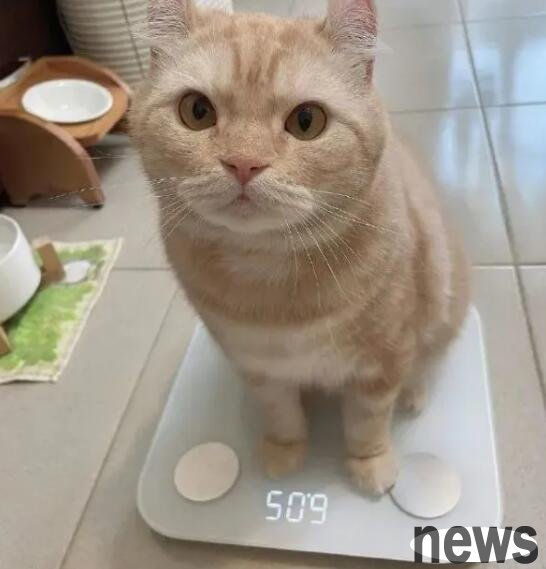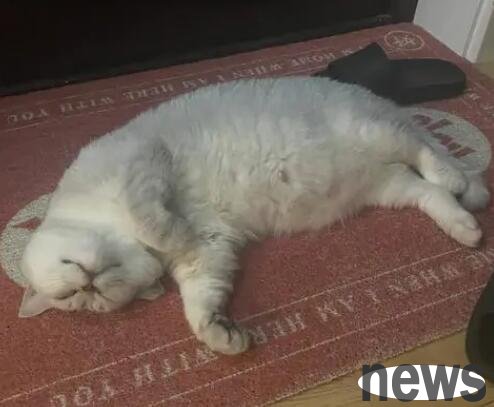Have your cat lost weight by itself? Unexpected weight loss is often a sign of underlying health problems. Many owners think that weight loss in older cats is normal, but this is not the case. If you notice that your cat has unexplained weight loss, be sure to take action.
How to tell if your cat is losing weight?
If it happens gradually, it is difficult to tell if your cat is actually losing weight. If your cat has a lot of hair or has been slightly overweight, it is difficult to tell when weight loss occurs.
To evaluate the cat's physical condition, you must first observe the cat's body from above. At the ideal weight, there should be a noticeable but not extreme pleat at the waist. Next, place your hands on both sides of the cat. The ribs should be covered with a thin layer of fat. If the ribs feel very prominent and visible, your cat may be underweight.
What causes cats to lose weight?
In many cases, cats lose weight when they don't eat enough. However, despite adequate food intake, some diseases can still lead to weight loss. Depending on the cause, weight loss may or may not be accompanied by other signs of illness. Many health problems can lead to weight loss in cats, some of which are more serious than others.

1. Hyperthyroidism is a relatively common disease that most often affects elderly cats. Due to goiter, cats with hyperthyroidism can produce too much thyroid hormone. This enlargement is usually caused by benign tumors growing on the thyroid gland. Common symptoms of hyperthyroidism include weight loss, increased appetite, thirst and increased urination. Some cats also experience vomiting, diarrhea and ADHD. 1 Some cats can make sounds and act restless. The fur of cats with hyperthyroidism may look messy and greasy. Hyperthyroidism is treated with radioactive iodine or oral medication.
2. Chronic kidney disease
Chronic kidney disease is one of the most common diseases in elderly cats. The kidney produces important hormones that filter waste in the blood, help regulate blood pressure, and promote the production of new red blood cells. When a cat's kidney stops functioning properly, it can cause various other problems.
When cats have kidney problems, thirst and increased urination are the first signs to be noticed, followed by loss of appetite, weight loss and lethargy. 2 Chronic kidney disease is not curable and is usually supplemented with medical treatment through medication, dietary changes and fluids.
3. Diabetes
Diabetes is another common disease that affects cats. This endocrine disorder affects the pancreas’ ability to produce insulin, a hormone that regulates blood sugar.
Signs of diabetes include weight loss, increased appetite, thirst and urination, and lethargy. 3 Diabetes are usually controlled by insulin and dietary changes. Other drugs may be used. Some cats even return to normal after several months of treatment.
4. Gastrointestinal problems
Any problems in the gastrointestinal tract will affect the cat's weight. First, gastrointestinal problems can reduce appetite. Second, some problems can prevent the gastrointestinal tract from properly digesting food and absorbing nutrients, resulting in weight loss. Some gastrointestinal problems found in cats include intestinal parasites, inflammatory bowel disease, pancreatitis and other pancreatic problems, and even gastrointestinal cancer.
Gastrointestinal problems may lead to loss of appetite, weight loss, vomiting, diarrhea, drowsiness, etc. Treatment of gastrointestinal parasites may be as simple as deworming a cat. Other gastrointestinal problems often require medication and supportive care.
5. Dental problems
Oral and dental problems can lead to extreme pain, loss of appetite and weight loss. Common dental problems in cats include periodontal disease, absorbent lesions, and tooth fractures. 5 Some cats will develop stomatitis, which is an immune-mediated inflammation of the cat's mouth and gums.
Signs of dental problems include bad breath, drooling, mouth biting with claws, and even bleeding in the mouth. The first step in treatment is to have your cat under anesthesia and perform professional teeth cleaning, examination and treatment as needed. Some cats require oral surgery and/or tooth extraction.

6, Cancer
Like humans, cats can develop cancer in almost any part of the body. Cancer may or may not appear in the form of a tumor. Lymphoma is one of the common cancers in cats. It can exist in the gastrointestinal tract, oral cavity, lymphatic system, etc. Most forms of cancer can eventually lead to general discomfort, lethargy, pain, muscle atrophy, loss of appetite and overall weight loss.
7. Stress
Cats are very sensitive to changes in their homes. Because they are usually good at hiding external signs of stress, they may experience greater symptoms later. Any environmental stressor can cause anxiety and stress in the cat. Loss of appetite is a common sign of stress and can ultimately lead to weight loss.
There are many other health problems that may lead to d weight loss. If your cat has potential health problems, you may or may not notice other signs of illness. Furthermore, many diseases have similar symptoms, so a veterinarian is required for diagnosis. Treatment of weight loss in cats
The treatment of weight loss in cats depends on the cause. If you notice that your cat is losing weight, your first step should be to schedule a veterinary appointment. Your veterinarian will first perform a physical examination. Next, laboratory tests and/or X-rays may be required to determine the problem. Based on the findings, your veterinarian may recommend medication, dietary changes, surgery, or other treatments.
If your veterinarian gives your cat a clean health certificate, the weight loss may be due to insufficient food intake or some unknown or undetectable condition. Ask your veterinarian for feeding and environmentally abundant advice. If you can determine where your cat is stressed, start by working to relieve stress. Your veterinarian can also recommend a diet that has the right nutrition and calorie content, which may help your cat gain weight.
If your cat still loses weight despite your changes, then be sure to follow up with your veterinarian. Your veterinarian may refer you to a veterinary specialist for advanced diagnosis.
